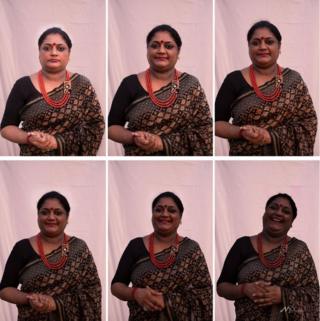- UID
- 20
- Online time
- Hours
- Posts
- Reg time
- 24-8-2017
- Last login
- 1-1-1970
|
|
━━━━━━━━━━━━━━━━━

Midhun Divakar
▼ Black, which has ruled the global fashion landscape for decades, has never been dominant in traditional Indian clothing. But now Indian sari designer Sharmila Nair is using the colour to make a forceful political and feminist statement, writes the BBC's Geeta Pandey in Delhi.
Ms Nair's campaign, 18 Shades of Black, has 18 women, draped in beautiful black saris designed by her, talking about the subtle gender discrimination they face in their daily lives.
Ms Nair calls these "unseen restrictions" because they are made to feel so normal, so natural, that quite often women start to place these limitations on themselves.
The campaign, Ms Nair told the BBC, was inspired by last year's protests in the southern state of Kerala after the Supreme Court revoked a ban on women of menstruating age from entering the Sabarimala temple, one of the holiest Hindu shrines.
Hinduism regards menstruating women as unclean and so they were historically banned from entering the temple.
Ms Nair said she was "shocked" by the large number of women who joined the protests.
Thus was born 18 Shades of Black - 18 because there are that many steps in the Sabarimala shrine, and black because that's the colour all devotees wear.

Midhun Divakar
"We are told we are impure during our periods, and we buy into these ideas. Even now I have friends who would voluntarily stay away from visiting a temple or participating in religious rituals during their periods," says Ms Nair.
"So I thought if so many women can fight for the rights of a deity, why can't they fight for the rights of women? And I thought if so many women came together, imagine the kind of changes they can bring about."
This subtle conditioning of the mind, she says, starts in early childhood.
"We are told boys and girls are different, girls don't talk or laugh loudly. In villages, even today, girls are encouraged to study humanities, not medicine or engineering.
"There is a lot of emphasis on marriage and having children. For instance, in many parts of India, the moment you turn 18, your family will start talking about fixing your marriage. And once you're married, they'll start asking when you're going to have a child. And once you have a child, they'll start asking when you're going to have the next one.
"We internalise these restrictions. We talk about women's empowerment, but in our daily lives we submit to these curbs unquestioningly," she says, adding: (▪ ▪ ▪)
► Please, continue reading this article here: Source |
|